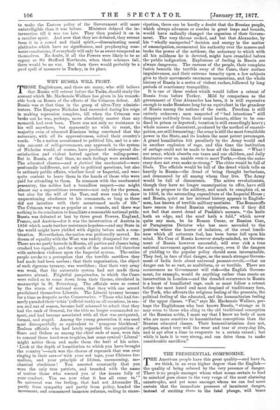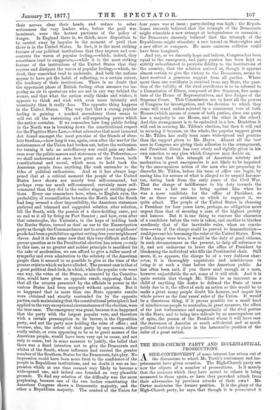THE PRESIDENTIAL OOMPROMISE.
THE American people have this great quality—and have it, we think, in an even higher degree than the English— the quality of being sobered by the very presence of danger. There is no people amongst whom what seems certain to lead to mischief goes closer to the very verge of the most alarming catastrophe, and yet none amongst whom we can feel more certain that the immediate presence of imminent danger, instead of exciting them to the fatal plunge, will brace their nerves, clear their heads, and reduce to sober seriousness the very leaders who, before the peril was imminent, were the hottest partisans of the policy of danger. In England there is, we think, more disposition to be carried away by impulse in the moment of peril than there is in the United States. In fact, it is the most striking feature of our political institutions that they express and con- centrate the waves of popular feeling,—which, indeed, they sometimes tend to exaggerate,—while it is the most striking feature of the institutions of the United States that they repress and dissipate the waves of popular feeling,—which, in- deed, they somewhat tend to underrate. And both the nations appear to have got the habit of reflecting, to a certain extent, the tendency of their institutions. There is no doubt that the uppermost phase of British feeling often assumes too im- posing an air to spectators who are not in any way behind the scenes, and that what the nation really thinks and wishes, it appears to think and wish with even more intensity and unanimity than it really does. The opposite thing happens in the United States. The very fact that a strong popular feeling is gaining a marked ascendancy there seems to call out all the restraining and self-repressing power which the nation contains. If we remember how long public feeling in the North was in breaking down the constitutional respect for the Fugitive Slave Law,—what advocates that most immoral Act found amongst the most genuine of the friends of abso- lute freedom,—how long it was, again, even after the war for the maintenance of the Union had broken out, before the enthusiam for turning it into an anti-Slavery war could gain any influ- ence over the politic masses and statesmen of the Federation,— we shall understand at once how great are the forces, both constitutional and moral, which seem to hold back the American people from anything like rash surrender to the tides of political enthusiasm. And so it has always hap- pened that at a critical moment the people of the United States have shown not merely true self-command, but perhaps even too much self-command, certainly more self- command than they did in the earlier stages of exciting ques- tions. Every one remembers how, when, to English eyes, the probability of reconciliation between the North and the South had long seemed a clear impossibility, the American statesman parleyed and trimmed and suggested solution after solution, till the South, with the passion of a slave-holding caste, put an end to it all by firing on Fort Sumter ; and how, even after that catastrophe, the Unionists, in the hope of holding back the Border States, turned as deaf an ear to the Emancipation party as though the Commandment not to covet your neighbours' goods had been a prohibition against setting free your neighbours' slaves. And it is the same now that this very difficult and dan- gerous question as to the Presidential election has arisen ;—only in this case, as no greater and nobler principle is sacrificed for the sake of moderation, we can afford to give a fuller meed of sympathy and even admiration to the sobriety of the American peeple than it seemed to us possible to give at the time of the greater crisis to which we have alluded. The present case is that of a great political dead-lock, in which, while the popular vote went one way, the votes of the States, as counted by the Constitu- tion, would have given an opposite result, supposing, that is, that all the returns presented by the officials in power in the various States had been accepted without question. But it so happened that in more than one State opposite results were obtained and stoutly contended for by the opposite parties, each maintaining that the constitutional principles it had applied to the very exceptional circumstances of the election, were the true ones. The emergency was great, because it so happened that the party with the largest popular vote, and therefore with a certain presumption in its favour, is the Opposition party, and not the party now holding the reins of office ; and because, also, the defeat of that party by any means, either really unfair, or even appearing to be so to great masses of the American people, would have been very apt to cause, and not only to cause, but in some measure to justify, the belief that there was a fixed intention not to give the Democrats and whites of the South, whose influence had carried the greater number of the Southern States for the Democrats, fair-play. No impression could have been more fatal to the confidence of the people in Republican institutions, and no doubt it was an im- pression which at one time seemed very likely, to become a wide-spread one, and indeed one founded on very plausible grounds. To find any solution of the difficulty was the more perplex. mg, because one of the two bodies constituting the American Congress shows a Democratic majority, and the other a Republican majority. The control of the Union for
four years was at issue ; party-feeling was high ; the Repub- licans sincerely believed that the triumph of the Democrats might stimulate a new attempt at independence or secession ; the Democrats sincerely believed that the triumph of the Republicans might stimulate a new inroad on State-rights and a new effort at conquest. No more ominous collision could have been imagined.
And yet, as we sincerely hope and believe, Congress has been equal to the emergency, and party passion has been kept so strictly subordinated to patriotic fidelity to the institutions of the country, that the solution arrived at, though it appears almost certain to give the victory to the Democrats, seems to have received a generous support from all parties. Where more than one certificate is received from any State, the ques- tion of the validity of the rival certificates is to be referred to a Commission of fifteen composed of five Senators, five mem-
bers of the House of fifteen, and five Judges of the Supreme Court. This Commission are to have all the powers of Congress for investigation, and the decision to which they come will stand unless rejected by a concurrent vote of both Houses (which means of course of both parties, since one party has a majority in one House, and the other in the other). And this arrangement is to be embodied in a law. Doubtless it will end in securing Mr. Tilden's election, but then it will end in securing it because, on the whole, the popular support given to Mr. Tilden has really been more wide-spread and genuine than the support given to Mr. Hayes. Almost all the best men in Congress are giving their adhesion to the arrangement, and President Grant has very wisely and rightly giiren in his own sanction to any plan which Congress may decide on.
We trust that this triumph of American sobriety and moderation in great emergencies is not likely to be impaired by the unscrupulous action of the men who are preparing to discredit Mr. Tilden, before his term of office can begin, by sueing him for arrears of what is alleged to be unpaid Income- tax, dating back from the early years of the Civil War. That the charge of indifference to his duty towards the State was a fair one to bring against him when he was a mere candidate for the office of President, so far as there was evidence on which to support it, we quite admit. The people of the United States in choosing a President for four years have, perhaps, no obligation more urgent than that of securing a man of the highest probity and honour. But it is one thing to canvass the character of a candidate before the vote is taken and another to blacken needlessly that of the inevitable ruler, when no convic- tion—even if the charge could be proved to demonstration— could prevent his becoming the ruler of the United States. Even if the charge were true, it would be the duty of good citizens, in such circumstances as the present, to drop all reference to it, and not endeavour to lower the office of President by blackening the individual who fills the Presidential chair. Still more, if, as appears, the charge be of a very dubious char. aeter, it is thoroughly unpatriotic and mischievous to bring it at such a time before the American public. As has often been said, if you throw mud enough at a man, however unjustifiable the act, some of it will stick. And it is quite certain that though Mr. Tilden be as innocent as a child of anything like desire to defraud the State of taxes fairly due to it, the effect of such an action as this would be to make a great many people doubt his honour, and impair his whole power as the four years' ruler of the Union. It would be a disastrous thing, if it proves possible for a small knot of mischievous people to neutralise, in great measure, the effect of the just forbearance and magnanimity of the rival parties in the State, and to bring into ridicule by an unscrupulous act of spite, the person of the President whom it will have cost the statesmen of America so much self-denial and so much political fortitude to place in the honourable position of the ruler of a great nation.



































 Previous page
Previous page